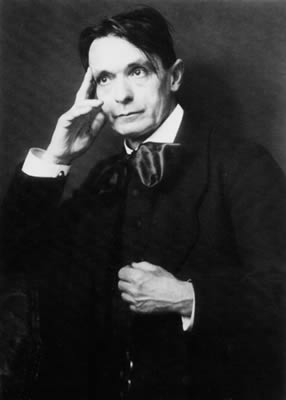What is Anthroposophy?
The Denver Waldorf School’s educational model is based on Rudolf Steiner’s philosophy of developing the whole human being and is informed by Anthroposophy (a philosophy of human wisdom).
Like the term “philosophy,” Anthroposophy denotes a method of inquiry, a path of research, rather than a content or fixed set of ideas.

Rudolf Steiner
“When a school is based on a spiritual conception of the human being, a more diverse set of values become important. When enlivened thinking is valued, high test scores and scholastic aptitude are seen as partial indicators, limited accomplishments if they are not accompanied by an equal measure of genuine interest and concern for the world.”— Jack Petrash in “Understanding Waldorf Education: Teaching From the Inside Out”
Steiner once characterized Anthroposophy as an upside-down plant, with its roots in the heavens (the world of the spirit) and its blossom and fruit in practical life on earth. This “growing down” means that clear insights born of disciplined spiritual research can help us re-enliven the practice of education, health, farming, technology, and countless other areas of daily life.
Anthroposophy can also be defined as a path of knowledge or spiritual research developed on the basis of European idealistic philosophy, rooted in the philosophies of Aristotle, Plato, and Thomas Aquinas. It is primarily defined by its method of research and, secondly, by the possible knowledge or experiences this leads to.
From this perspective, Anthroposophy can also be called spiritual science. As such, it is an effort to develop not only natural scientific, but also a spiritual scientific research on the basis of the idealistic tradition, in the spirit of the historical strivings, that has led to the development of modern science.
On this basis, Anthroposophy strives to bridge the clefts that have developed since the Middle Ages between the sciences, the arts, and the religious strivings of man as the three main areas of human culture, and build the foundation for a synthesis of them for the future.
Anthroposophy is also an impulse to nurture the life of the soul in the individual and in human society, meaning, among other things, to nurture the respect for and interest in others on a purely human basis independently of their origin and views.
For adults seeking to develop a spiritual path, Rudolf Steiner developed six basic exercises which are fundamental to his meditative work.
More resources:
The Denver Branch of The Anthroposophical Society
The Anthroposophical Society in America
Rudolf Steiner’s Foundational Works
Foundations of Waldorf Education
Center for Anthroposophy: Waldorf Teacher Education and Renewal
With files from The Center for Anthroposophy, Robert Mays and Sune Nordwall of Waldorf Answers
